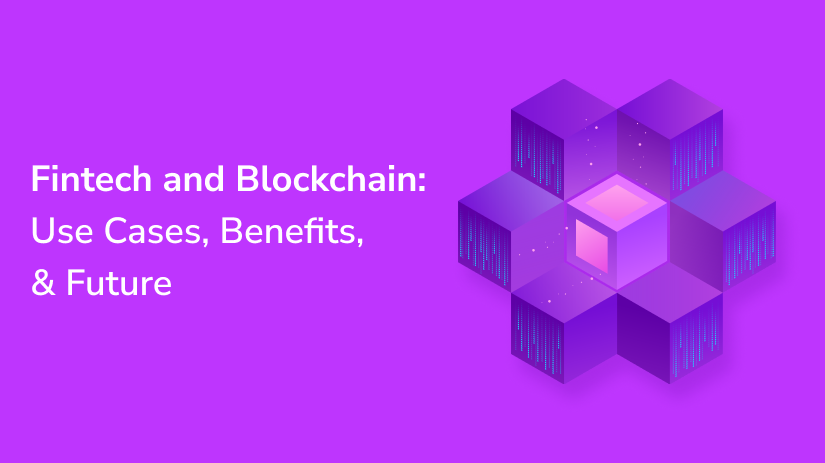In the rapidly evolving landscape of financial technology (fintech), few innovations have captured as much attention and potential as blockchain technology.
Originally devised as the underlying technology for Bitcoin, blockchain has since expanded its reach far beyond cryptocurrency to revolutionize various sectors, with fintech being at the forefront of this transformation.
This blog explores the symbiotic relationship between fintech and blockchain, delving into their use cases, benefits, and the promising future they hold.
Let’s Begin!!
Connect with us for Fintech Development Needs
Trusted by companies like Plaid, Yodlee, Codat.
Fintech and Blockchain: What is It?
Fintech encompasses a broad spectrum of technological innovations aimed at enhancing and automating financial services. These innovations range from mobile payment apps and peer-to-peer lending software development to algorithmic trading and robo-advisors.
Fintech solutions have gained popularity due to their ability to improve efficiency, accessibility, and cost-effectiveness in financial transactions and services.
Blockchain, on the other hand, is a decentralized and distributed ledger technology that records transactions across a network of computers in a secure and transparent manner. Each block in the blockchain contains a cryptographic hash of the previous block, creating a chain of blocks linked together, hence the name.
This decentralized nature eliminates the need for intermediaries like banks or payment processors, offering enhanced security, transparency, and immutability.
Use Cases of Blockchain in Fintech

Digital Payments and Remittances
Blockchain enables faster, cheaper, and more secure cross-border payments and remittances by eliminating intermediaries and reducing transaction costs. Companies like Ripple and Stellar are leveraging blockchain to facilitate instant settlement of transactions across borders.
Smart Contracts
Smart contracts are self-executing contracts with the terms of the agreement directly written into code. Blockchain platforms like Ethereum enable the creation and deployment of smart contracts, automating and enforcing contractual agreements without the need for intermediaries.
Identity Verification and KYC
Blockchain-based identity verification solutions offer a secure and efficient way to verify identities, reducing the risk of identity theft and fraud. These solutions provide individuals with greater control over their personal data while complying with Know Your Customer (KYC) and Anti-Money Laundering (AML) regulations.
Supply Chain Finance
Blockchain technology can enhance transparency and traceability in supply chains by recording every transaction and movement of goods on a decentralized ledger. This transparency reduces the risk of fraud and ensures the authenticity and integrity of products throughout the supply chain.
Asset Tokenization
Blockchain enables the fractional ownership and tokenization of assets such as real estate, art, and commodities. By representing assets as digital tokens on a blockchain, individuals can buy, sell, and trade fractions of high-value assets, unlocking liquidity and democratizing access to investment opportunities.
As you know the use cases of blockchain in fintech, let’s explore the key advantages of fintech and blockchain integration.
Connect with us for Fintech Development Needs
Trusted by companies like Plaid, Yodlee, Codat.
Benefits of Fintech and Blockchain Integration

Efficiency
By automating processes and eliminating intermediaries, financial software solutions powered by blockchain offer increased efficiency and faster transaction speeds.
Cost Reduction
Blockchain reduces the need for manual reconciliation and verification processes, leading to lower operational costs and transaction fees.
Transparency and Security
Blockchain’s decentralized and immutable nature ensures transparency and security, reducing the risk of fraud, data manipulation, and cyberattacks.
Financial Inclusion
Fintech solutions powered by blockchain have the potential to extend financial services to underserved populations by bypassing traditional banking infrastructure and enabling peer-to-peer transactions.
Innovation
The integration of fintech and blockchain fosters innovation by enabling the fintech application development of new financial products and services that were previously not feasible or cost-effective.
The Future of Fintech and Blockchain
The future of fintech and blockchain holds immense promise as these technologies continue to mature and evolve. As regulatory frameworks become clearer and adoption rates increase, we can expect to see even greater blockchain integration into various fintech applications.
Emerging technologies such as artificial intelligence (AI) and the Internet of Things (IoT) are also likely to intersect with fintech and blockchain, further enhancing their capabilities and expanding their use cases.
However, challenges such as scalability, interoperability, and regulatory compliance remain significant hurdles to overcome. Addressing these challenges will require collaboration between industry stakeholders, policymakers, and regulators to ensure the responsible and sustainable development of fintech and blockchain solutions.
Final Words
In conclusion, the integration of fintech and blockchain represents a paradigm shift in the way financial services are delivered, accessed, and managed. By harnessing the transformative potential of these technologies, we can create a more inclusive, efficient, and secure financial ecosystem for individuals and businesses worldwide.
Connect with us for Fintech Development Needs
Trusted by companies like Plaid, Yodlee, Codat.





